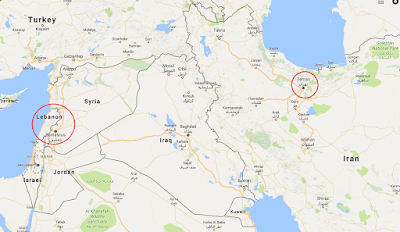 |
| Carrying the Football |
[Note: The President doesn't have any 'nuclear codes'. The famous 'football' that is always with him everywhere and at all times is a set of pre-developed Operational Plans that describe the weapons and targeting to be used against any given adversary. It also contains a set of one-time codes and ciphers that allow the president - using advanced cryptography - to authenticate his identity. Once the President issues the order and authenticates the source of the order is the National Command Authority, it is carried out by people who most assuredly DO have the nuclear codes.]
The reason for this seemingly dangerous - and make no mistake, it IS dangerous - system to be in place is based upon years of the study of nuclear weapons strategy. The idea is that nuclear weapons are not to be used - they are intended to deter any other nation's use of their strategic weapons. The number one overarching fear has always been a 'first strike'. If a nation, the thinking goes, believes it can launch a nuclear attack on a rival that eliminates the vast majority of that nation's ability to retaliate, the temptation would be to go ahead and launch. It would put the risk of global nuclear annihilation in the rear view mirror for all time.
This concern led to the streamlined command structure we have now. Russian (Soviet before) missiles coming over the pole can hit the American missile silos scattered across the northern prairie in less than fifteen minutes. The only way to deter such an attack, say the strategists, is to configure a system we call 'Launch on Warning'. If an incoming nuclear strike is detected, the entire system is designed to get OUR missiles in the air before THEIR missiles start landing. And that means one person in the chain of command, one fast decision, and the end of the world.
Oddly, despite some close calls and near misses, this system has worked for more than half a century. Nobody decided to launch a first strike, because nobody believed that a first strike would 'work'. They launch 2000 missiles, we launch 1500 missiles, then everybody dies. Nobody wins. In the Cold War, that strategy was called, quite accurately MAD (Mutually Assured Destruction). You don't start a war if everybody dies.
So after all these years, the unthinkable happened. The United States population lost its collective mind and elected an eight year old with impulse control issues to the presidency. And with that, we quite logically rend our garments over this president's access to such god-like power. But if we interject another process in the launch order, we reduce the deterrence value of our strategic forces, and invite a first strike. Which way would be more likely to lead to war? Nobody really knows, but you don't get any do-overs in nuclear war.
Another topic that has gotten a lot of attention recently is the global elimination of nuclear weapons. The Swiss organization ICAN (International Campaign to Abolish Nuclear Weapons) won the Nobel Peace Prize this year, and organizations such as Global Zero, the Ploughshares Fund, the Federation of American Scientists and others have been working on this goal for dozens of years.
So - is it possible? Hey, anything's possible, but the process seems highly unlikely to me. If everybody and every nation - operating in perfectly good faith - eliminated nuclear weapons, then one bad national leader could secretly develop a few crude atomic weapons and dictate terms to the rest of the world.
Unless and until somebody can describe a methodology in which either nobody will cheat or cheating will be somehow nullified, you're not going to see nations give up their strategic deterrent. Personally, I believe that technology, once in the wild, can never be truly rolled back. Machine guns, drones, robots - anything that makes killing and destruction more efficient and effective - will be used simply because they exist. Nuclear weapons are so destructive that they can form their own deterrence regime, but if that deterrence regime is weakened sufficiently, that's what will lead to their use.
...





